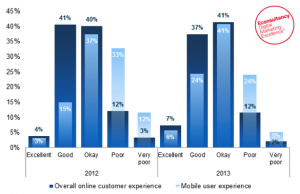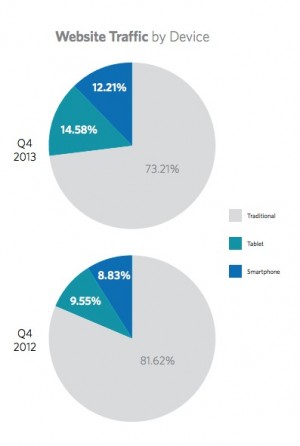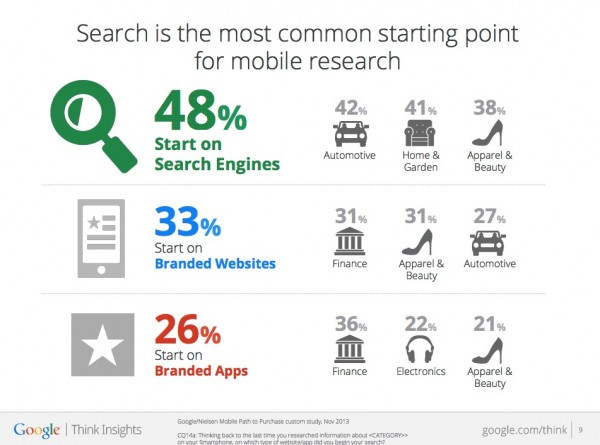
Mobile has grown past the point of merely driving customers to brick and mortar stores. It has become a central sales point. Mobile customers are task-oriented and brands need to ensure they provide an intuitive mobile eCommerce experience, because unlike desktop or in-store, customers are much less likely to spend time browsing for products and are more likely to visit mobile sites with a purpose to buy.
No one screen size has more than 20% of the market share. - Mobify Research & Development
 How companies rate their understanding of the mobile user experience compared to the overall online customer experience.
How companies rate their understanding of the mobile user experience compared to the overall online customer experience.
Today’s web users have high expectations of their mobile experiences despite the relative immaturity of the smartphone. Recent research from Harris Interactive found that if they do encounter problems, 16% admit they would become more likely to buy from a competitor, while 13% would abandon the transaction altogether and try a competitor’s mobile website instead. Understanding the mobile user experience is more important then ever.
The most serious issues faced by visitors using e-commerce sites via mobile are screen-sizing issues, bad navigation and poor ‘findability’. Here are 3 tips brands should take to address these issues:
#1. Design an interface that is user-friendly for mobile
An ecommerce website’s design, usability and ease are what the customer will immediately judge the brand by and most will leave if the user interface is not rock solid for mobile. The user interface will impact a customer’s mobile shopping experience. Account for size of an average customer’s finger, don’t make mobile users fill out long forms, account for various device widths, and make pages zoomable.
Customers usually look to mobile shopping as an easier and more convenient alternative to shopping in store and online, so ease-of-use in mobile sites plays a significant role in brand loyalty. Despite this, just 2 in 5 brands said they use mobile-specific toolkits to improve the performance of their mobile sites.
 #2. Listen to customers and adapt a culture of change
#2. Listen to customers and adapt a culture of change
Customers have lots of ways of telling a brand what they are and are not happy about. If they have a bad experience, they are more likely to vent their frustrations on social sites, which can be hugely detrimental to a brand's name. Reducing the customer struggle has never been more vital. Approaches such as online surveys, reviews, social media listening tools, and usability heat maps are all effective in understanding exactly how your customers feel and what they think about their customer experience at all of a brand's touch points, including mobile.
Brands must be open to adapting their mobile customer experience based on customers’ messages and must do so quickly. Since a brand’s customers are their best quality control mechanism they will get feedback quickly and in bulk. Customers who feel heard and see change will remain loyal.
#3. Consistency across all digital channels embraces the customer
Consistency across all channels is vital. There is nothing more annoying for customers than when they switch from a desktop website to a mobile website site and need to re-learn the experience, cannot easily navigate through it, or lose the items they ‘saved’ when switching between platforms. It is vital that the user interface across channels are similar to give customers a consistent experience, enable customers to easily familiarize themselves with the brand and to provide customers with a single customer experience.
For example, many customers prefer to research products on their mobile devices for a later purchase. Allowing customers to save “Favorites” that could be accessed for purchase later will provide for a seamless experience.

Brands should remove the clutter, advertisements, and any other irrelevant information for mobile app design. Consider the most important things consumers need to do or find through your mobile experience and provide enough information for them to complete those tasks on the go.
Mobile customer expectations have increased vastly. They expect a quicker, easier and more convenient alternative to other shopping channels. And while many brands have admitted that investment in mobile is a big priority for them, they need to listen to what customers want, and comply.
by Jonathan Franchell, CEO of Ironpaper - For more tips and hacks: Need to remove a new line after h1 tags? Both web designers and SEO practitioners need to employ headline tags: H1, H2, H3 in several ways to improve web page structure and tag...

The marketing industry is transforming significantly due to generative AI and increasing market complexity. Gartner's prediction of a 25% decline in traditional search traffic suggests that the era of search engines is dying. AI tools, particularly...

The Crowded Arena of the IT Marketplace Updated December 2024 The Information Technology (IT) landscape is experiencing rapid growth and intensifying competition. IT spending is projected to reach nearly 5.1 trillion U.S. dollars in 2024, a...

Updated December, 2024 The field of digital marketing is evolving rapidly in response to new technology and changing buyer expectations. To help career-minded marketers, we’ve rounded up the top 10 skills needed to succeed in the field. These are...
